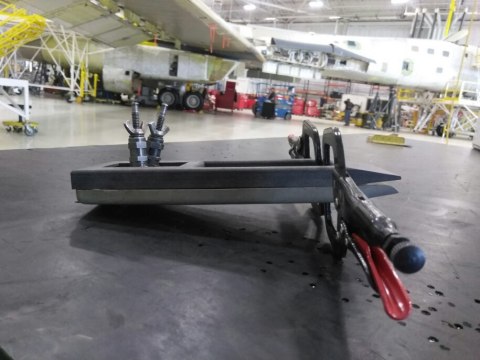The Utah Advanced Materials & Manufacturing Initiative (UAMMI) announced
that it has successfully created and fit-checked its first carbon fiber
3D printed part for the United States Air Force – a first aid kit
restraint strap for the B-1 aircraft at Tinker Air Force Base in
Oklahoma. The part was made using a printer from project partner
Impossible Objects.
This press release features multimedia. View the full release here:
https://www.businesswire.com/news/home/20190521005346/en/

The first carbon fiber part 3D printed for the U.S. Air Force: a first aid kit restraint strap for B-1 aircraft. (Photo: Business Wire)
A year ago, UAMMI was awarded federal funds to create carbon fiber
additive manufactured parts (“3D printed”) for the United States Air
Force. The goal was to replace broken parts on older legacy aircraft as
most original parts are no longer produced.
Over the last year, UAMMI has been working with the Air Force to
identify non-critical parts that can be replaced using additive
manufacturing technology. One of the earliest agreed upon parts was a
restraint strap for a first-aid kit in the B-1 aircraft. In many of
these aircraft, the Air Force has experienced failures with original
restraint straps, which puts at risk the dislodging of first-aid kits
during flight. As original replacement straps are no longer
manufactured, there is significant costs and wait time to have a new
parts produced through traditional means.
Using a state-of-the-art additive manufacturing machine from Impossible
Objects UAMMI has successfully produced a replacement part using carbon
fiber and thermoplastic materials. In April, they took the part to
Tinker Air Force Base to fit check it with an operational B-1 aircraft.
The installation of the part included adding new rivet holes, inserting
a buckle in the strap cavity, and fastening the strap to the cockpit
wall panel. The installation went smoothly and the B-1 program engineers
were pleased with the fit, commenting that they were surprised the part
fit so well on the first try.
The additive manufacturing project is being funded through the Air Force
Research Laboratory under an America Makes program called the Maturation
of Advanced Manufacturing for Low Cost Sustainment (MAMLS). Through
MAMLS, the Air Force intends to demonstrate that additive manufacturing
can be used to replace non-critical parts on-demand. Of particular
interest are instrumentation knobs, wiring harnesses, small brackets,
electrical connectors and similar items.
“Additive manufacturing represents a huge opportunity for Utah’s
advanced manufacturing industry,” said Jeff Edwards, UAMMI Executive
Director. “The composite additive parts that we are creating for the Air
Force will significantly reduce both the time and cost of aircraft
repairs. There is a long list of parts we plan to test and this project
will help position Utah as the technology leader and innovator in this
new field.”
For the printing, UAMMI has partnered with equipment manufacturer
Impossible Objects from Illinois. Their unique additive manufacturing
machine uses Composite-Based Additive Manufacturing (CBAM) technology to
3D print with carbon fiber and thermoplastic materials. The Air Force is
particularly interested to prove out and accelerate CBAM technology as
well as build a body of knowledge for them to use in determining which
replacement parts are best suited for Composite-Based Additive
Manufacturing.
Now that the replacement part has successfully passed the initial B-1
fit-check, the team is ready for the final steps. Before further
production, they must run the part through a Fire, Smoke and Toxicity
Test at the National Institute for Aviation Research at Wichita State
University. Upon successful completion of that test, the part will be
ready for USAF approval and installation into the operational B-1 fleet.
About UAMMI
Founded in 2014, the Utah Advanced Materials and Manufacturing
Initiative (UAMMI) brings together public, private, community, industry
and education partners to assure growth and sustainability of Utah’s
advanced materials and manufacturing industry and maintain Utah’s
leadership in this key global industry. Being awarded this funding will
allow UAMMI to bring additive manufacturing, or 3D printing of carbon
materials, to the forefront here in Utah, which is quickly becoming a
major interest for many Utah advanced manufacturing companies.
www.UAMMI.org
About America Makes
America Makes is the National Additive Manufacturing Innovation
Institute. As the national accelerator for additive manufacturing (AM),
America Makes is the nation’s leading and collaborative partner in AM
and 3DP technology research, discovery, creation, and innovation.
Structured as a public-private partnership with member organizations
from industry, academia, government, non-government agencies, and
workforce and economic development resources, we are working together to
innovate and accelerate AM to increase our nation’s global manufacturing
competitiveness. Based in Youngstown, Ohio, America Makes is the first
Institute within the Manufacturing USA infrastructure and is driven by
the National Center for Defense Manufacturing and Machining (NCDMM). For
more information about America Makes, visit http://americamakes.us.
About MAMLS
The MAMLS program is the Maturation of Advanced Manufacturing for
Low-Cost Sustainment. It is funded by the Air Force Research Laboratory
(AFRL), Materials and Manufacturing Directorate, Manufacturing and
Industrial Base Technology Division. The program is aimed at improving
efficiency of the factory and/or AF Air Logistics Complexes for rapid
part replacement for legacy and other aircraft. https://www.americamakes.us/project-call-phase3-mamls/
About Impossible Objects
Impossible Objects, a 3D printer and materials company, was founded with
the belief that materials science inventions would enable 3D printing to
revolutionize the world in the same ways that computers and the Internet
have revolutionized the way we live, work and play. The company’s
proprietary composite-based additive manufacturing (CBAM) technology
produces parts up to 10 times faster than conventional 3D printing. By
combining high-performance polymers like Nylon and PEEK with long-fiber
carbon and fiberglass sheets, CBAM produces parts that are stronger,
lighter, with better temperature performance, and more durable than
possible with conventional 3D printing methods. For more information
visit www.impossible-objects.com.
View source version on businesswire.com: https://www.businesswire.com/news/home/20190521005346/en/
